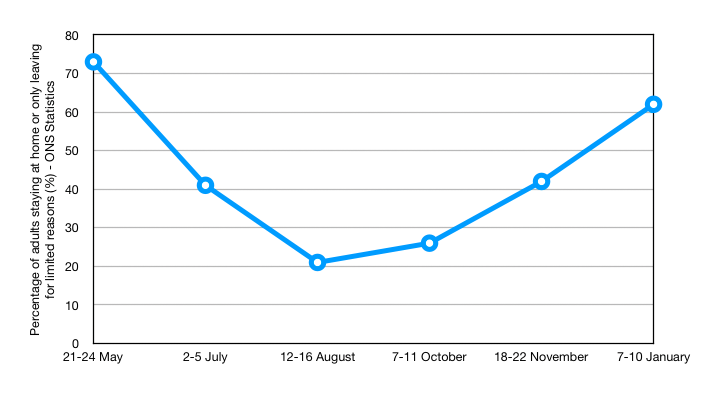More people in the UK are following strict lockdown measures – but levels of anxiety have increased as a result, a new survey revealed.
England are two weeks into their third national lockdown after Boris Johnson announced restrictions akin to those implemented in March after the first wave of coronavirus.
Johnson stressed on January 5 that ”now more than ever, must pull together” after a record 30% increase in Covid cases from the previous week.
And data from the Official National Statistics (ONS) proves new restrictions are having a significant impact on people’s behaviour.
Results from ONS’s Opinion and Lifestyle survey shows that from January 7, 62% of adults are staying at home or only leaving for work, exercise, essential shopping or medical needs.
That’s a significant rise from the 41% that would only leave for those purposes before Christmas.
Also, last week, around 9 out of 10 people (88%) said they supported the current lockdown measures compared to just 75% in the build up to Christmas.
However, people being stuck in lockdown has inevitably had a detrimental impact on mental health and the same study shows that more people are suffering from anxiety during this stage of the pandemic.
Anxiety levels are now the highest they have been since the first national lockdown in March.
On average, people scored their anxiety levels 4.6 out of 10, which is a 1.1 increase from pre-lockdown levels in February 2020 and a rise of 0.6 from the previous week.

Also, average life satisfaction has dropped to below 6.5 out of 10 for the first time since the pandemic started.
Elizabeth Simpson, CEO of charity Manchester Mind, has emphasised the importance of looking after your own mental health and others during this critical point of the pandemic.
“We are seeing that the pandemic has had a clear impact on mental health,” she said.
“We know that people with existing mental health issues have been one of the hardest hit groups along with young people.
“We are also starting to see that the pandemic is also triggering new mental health issues due to maybe loss of job or income and increased levels of isolation and uncertainty.
“It is more important than ever to seek help if you are struggling.
“The most important thing we can do if someone we know is struggling is to listen without judgement, acknowledge the difficulties people are facing and support them to access further help if this is what is needed.”
Despite Covid-19 cases remaining high, there is now a sense of optimism with people in their 70’s now being offered vaccines against the virus across England.
Over 4 million people have already received their first dose of the vaccine and 5.6 million in their 70s or clinically vulnerable people have begun receiving offers as the country expands its vaccination programme.
Main image credit: Boris Johnson Digital Covid-19 Presser 30/04” by UK Prime Minister.




